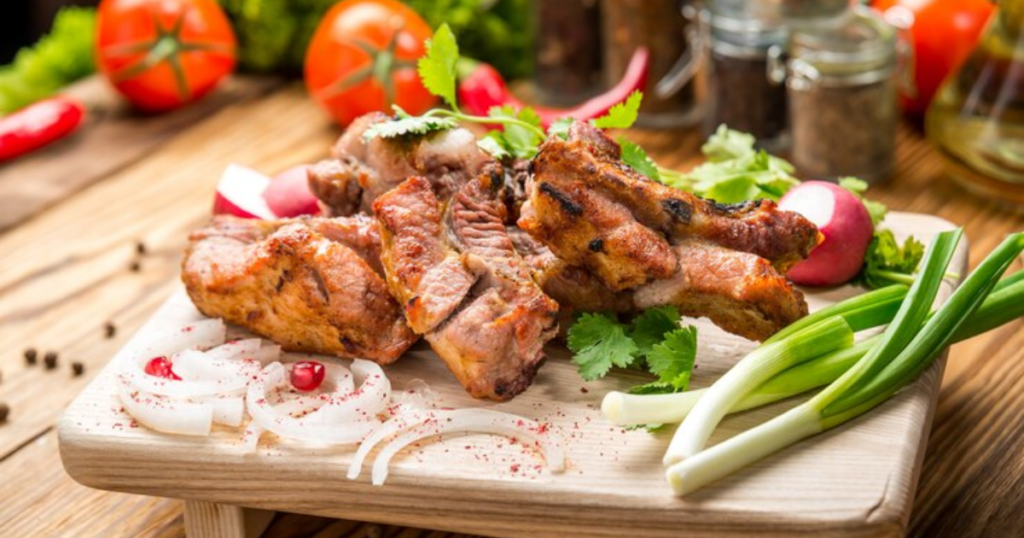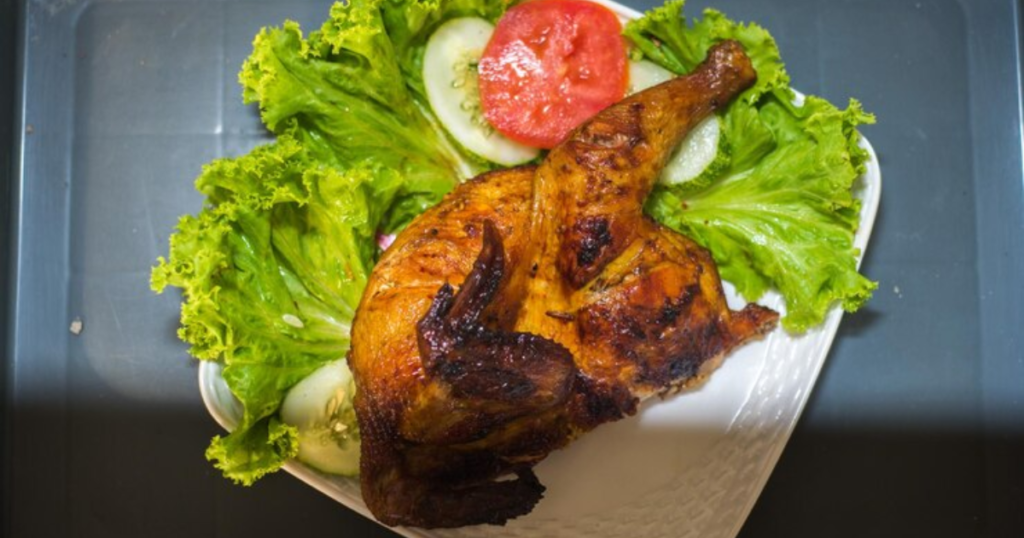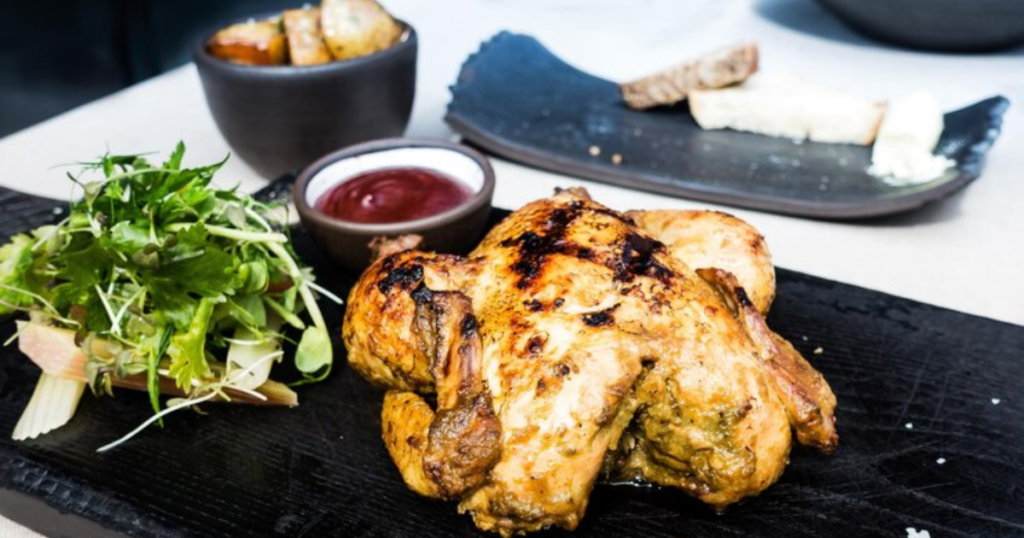Calories in a Whole Rotisserie Chicken

Rotisserie chicken has become a popular household item due to its convenience, adaptability, and great flavor. Whether you buy one from the grocery store or make it yourself, understanding the nutritional profile of whole rotisserie chicken, particularly its calories, is critical for people watching their diet.
Nutritional Profile of Rotisserie Chicken
Rotisserie chicken is a popular and convenient alternative for many people, providing a delicious and filling supper. Here’s a general summary of its nutritional profile:
Protein:
Rotisserie chicken is high in protein, which is necessary for the body’s tissue growth and repair. A typical dish can include between 25 and 30 grams of protein, depending on the size of the amount.
Fat:
The skin of rotisserie chicken includes a substantial amount of fat, thus choosing skinless chicken or removing the skin can help to lower fat content. However, chicken meat has less fat than other protein sources such as beef or hog.
Calories:
A serving of rotisserie chicken can have 150 to 250 calories, depending on the portion size and whether or not the skin is present.
Vitamins and Minerals:
Rotisserie chicken provides a variety of vitamins and minerals, including niacin, vitamin B6, and vitamin B12, as well as iron, zinc, and selenium. These nutrients are critical for energy metabolism, immunological function, and overall health.
Sodium:
One potential issue with rotisserie chicken is its sodium content, particularly if it has been seasoned or brined. Excessive salt intake can contribute to high blood pressure and other health problems, so it’s vital to be aware of this and choose reduced-sodium options wherever possible.
Carbohydrates:
Chicken meat is naturally low in carbs, making it a good option for low-carb diets. However, if the chicken has been seasoned or marinated in sugary or carbohydrate-containing sauces, the carb level may increase.

How Many Calories in a Whole Rotisserie Chicken?
The caloric content of a whole rotisserie chicken can vary slightly depending on factors such as size, seasoning, and cooking methods.
Here’s a breakdown of the nutritional content of a whole rotisserie chicken, including calories and other key nutrients:
| Nutrient | Amount per 1kg Chicken |
|---|---|
| Calories | Approximately 1300-1500 kcal |
| Protein | Approximately 100-120 grams |
| Fat | Approximately 80-100 grams |
| Saturated Fat | Approximately 20-30 grams |
| Carbohydrates | Approximately 0 grams (negligible) |
| Fiber | Approximately 0 grams (negligible) |
| Sugar | Approximately 0 grams (negligible) |
| Sodium | Approximately 800-1200 milligrams |
| Cholesterol | Approximately 300-400 milligrams |
Here’s a breakdown of the nutritional content of a whole rotisserie chicken, based on a serving size of 3.5 ounces (100 grams) of cooked chicken:
| Nutrient | Amount per 3.5 oz (100g) serving |
|---|---|
| Calories | 165-195 calories |
| Protein | 25-30 grams |
| Fat | 7-10 grams |
| Carbohydrates | 0 grams (chicken meat itself) |
| Fiber | 0 grams |
| Sodium | 70-100 milligrams |
| Cholesterol | 70-100 milligrams |
Is Rotisserie Chicken Healthy?
Rotisserie chicken is a healthy option,
but its health depends on factors like preparation and consumption. Chicken is a good source of lean protein, but its fat content is higher in dark meat and skin. Skinless chicken or removing the skin before eating can reduce fat.
Store-bought rotisserie chickens may contain high sodium, which can be unhealthy for those with high blood pressure or reduced sodium intake. Some store-bought chickens may contain additives, preservatives, or flavorings. Eating appropriate portion sizes is crucial for maintaining a healthy diet.

What Are the Benefits of Eating Rotisserie Chicken?
1. Nutrient-Rich Protein Source
Rotisserie chicken is a high-quality protein source that can help you maintain or grow muscle mass. It is necessary for muscle repair, growth, immune system support, and hormone production. A single serving meets a large amount of the daily protein requirement, ensuring energy and satisfaction.
2. Convenient and Time-Saving
Compared to traditional whole chicken preparation, rotisserie chicken provides convenience and quick dinner options. It’s readily available in supermarkets and delis, making it a quick and easy supper alternative for individuals who are short on time or don’t cook. Rotisserie chicken can be eaten alone or mixed into salads, sandwiches, and wraps.
3. Budget-Friendly Option
Rotisserie chicken is a cost-effective solution for gourmets, saving time and money over raw chicken. Leftovers may be recycled into tasty meals, allowing you to stretch your grocery budget and reduce waste.
4. Healthier Cooking Method
Rotisserie cooking, a slow-roasting method, is lower in fat and calories than other methods such as frying or deep-frying. This enables a tasty meal without jeopardizing nutritional goals, making it a better option for a healthier meal.
5. Source of Essential Nutrients
Rotisserie chicken is high in protein but also provides several vital elements that promote general health and well-being. These include B vitamins (particularly B6 and B12), which are essential for energy metabolism and nerve function, as well as minerals like iron and zinc, which are required for immunological function and tissue repair.

Are Rotisserie Chickens Good For Weight Loss?
Rotisserie chickens are a simple alternative for weight loss because they are usually lean and high in protein. Protein promotes satiety and helps to maintain muscle mass during weight loss.
However, it is critical to consider portion proportions as well as any extra fats or seasonings that may raise the calorie count. Furthermore, the skin of rotisserie chicken contains more fat and calories, so removing it or opting for skinless versions can help with weight loss.
Related: The Truth About Cortisol Mocktail For Weight Loss (2024)

Side Effects of Eating Rotisserie Chicken
Eating rotisserie chicken has benefits, such as convenience and flavor, but there are also potential downsides to consider:
- High Sodium Content: Rotisserie chicken is high in sodium, especially if it has been seasoned or marinated. Excess sodium consumption can lead to high blood pressure and other health problems.
- Added Preservatives: Some store-bought rotisserie chickens may contain preservatives or artificial chemicals to improve flavor and shelf life. These additives may not be suitable for people seeking a more natural or healthful diet.
- Potential for Cross-Contamination: Rotisserie chicken has the potential for cross-contamination if it is not handled and cooked properly. Cross-contamination can happen when the chicken comes into contact with other raw meats or surfaces that aren’t cleaned completely.
- Skin and Fat Content: While the skin of rotisserie chicken is delectable, it also contains a large amount of fat. Consuming too much fat, particularly saturated fat, can contribute to heart disease and other health issues if not balanced with a nutritious diet.
- Quality Concerns: The quality of rotisserie chicken varies depending on where it is acquired. Some may contain lower-quality or less fresh ingredients, affecting both taste and nutritional value.
Overall, while rotisserie chicken can be a fast and tasty lunch option, it’s vital to be aware of its potential downsides and to consume it in moderation as part of a healthy diet.
More to Read: Is Noosa Yogurt Healthy?
Conclusion
Finally, the calories of a whole rotisserie chicken vary according to size and cooking method. However, it remains a practical and nutritious alternative for people wishing to add lean protein to their diet. By paying attention to portion choices and cooking methods, you may reap the nutritional benefits of rotisserie chicken while limiting any negatives.
Frequently Asked Questions
How many calories are there in a whole rotisserie chicken?
A whole rotisserie chicken normally provides between 1,600 and 2,000 calories. However, this varies depending on the size and cooking method.
Are rotisserie chickens healthy to eat?
Yes, rotisserie chickens can be a healthy choice because they are high in protein and low in carbs. Just be cautious of any additional sauces or seasonings that may boost the calorie count.
What part of the rotisserie chicken has the most calories?
The skin of rotisserie chicken contains the most calories because it contains the majority of the fat. If you’re watching your calorie intake, you might wish to remove the skin before eating.
How can I make a rotisserie chicken meal healthier?
Instead of high-calorie sides like mashed potatoes or fries, serve your rotisserie chicken with plenty of vegetables or a salad to make it healthier. This allows you to enjoy the tasty chicken without adding too many calories.
Is it okay to eat rotisserie chicken every day?
While rotisserie chicken might be a convenient and healthy alternative, it’s important to vary your diet and avoid relying on it every day. Eating a variety of foods ensures that your body receives all of the nutrients it needs. Enjoy your rotisserie chicken, but mix it up with different meals!





It seems like you’re repeating a set of comments that you might have come across on various websites or social media platforms. These comments typically include praise for the content, requests for improvement, and expressions of gratitude. Is there anything specific you’d like to discuss or inquire about regarding these comments? Feel free to let me know how I can assist you further!